LEADING scientists and doctors have raised fresh concerns about the safety of a cervical cancer vaccine.
They have accused the manufacturers of Cervarix and another jab, Gardasil, of making misleading claims.
More than 1,300 British girls have reported adverse reactions to Cervarix, ranging from paralysis to convulsions and sight problems.
Hailed as a wonder drug, it is claimed the jab will give 70 per cent protection from the disease to every girl under 18 by 2011.
Earlier this month the Sunday Express revealed the story of Rebecca Ramagge, 13, of Reigate, Surrey, who has been unable to walk for six months because of a joint disorder.
Rebecca’s paediatrician blames her condition on Cervarix.
In Germany, 13 distinguished professors have complained that the jab makers, Glaxo SmithKline and Sanofi, have been guilty of giving “incorrect” information.
Professor Martina Doren, of the Charitie Hospital in Berlin, said: “What concerns us is that the two manufacturers of the vaccine aren’t always using facts. They claim that a lot of high-risk strains of cancer-causing virus are protected against but equally there are others that are not.
“If protection is not more than 20 per cent then that is an awful lot of money to be spending, particularly as the vaccines have quite serious side-effects.
“Assertions that a vaccine reduces the risk of cervical cancer by 70 per cent or even 98 per cent should not be made at this point.”
Professor Doren criticised the fact that the only trials for the vaccines were carried out on women aged between 15 and 26 while the vaccine was being given to 12 and 13 year olds.
She said: “It is wrong to vaccinate these girls when it has not been tried on this age group. It is unethical.
“We are meant to be in an era where drugs and vaccines to be used on children are given trials on that age group first before awarding a licence. Otherwise you are experimenting on children, which is wrong.”
Last night a spokesman for the German national vaccines committee told the Sunday Express that a review of the evidence was under way.
Meanwhile in the Netherlands there has been mass resistance to the vaccine with only 49 per cent of girls turning up to have the first jab of the three- injection course.
Six Dutch girls were taken to hospital after being inoculated and there have been reports of more than 500 other adverse reactions.
Doctors there are calling on their national vaccines committee to reconsider its decision to back vaccination of schoolgirls. Many scientists claim the figure of 70 per cent protection against cervical cancer is not based on scientific evidence and has been used to convince parents that their girls ought to have the jab.
Experts in Scotland, where the Health Service has spent more than £64million vaccinating schoolgirls, are also expressing concerns.
Scottish Conservative health spokeswoman Mary Scanlon said: “Given this new research, it is incumbent on the Scottish government and the chief medical officer to review the vaccination programme to ensure that it lives up to the expectations of preventing cervical cancer.”
Last February 80,000 jabs in Valencia and the Balearic Islands were withdrawn after three girls ended up in hospital with convulsions and loss of consciousness within hours of being inoculated.
Source: The Sunday Express, 31st May 2009.


